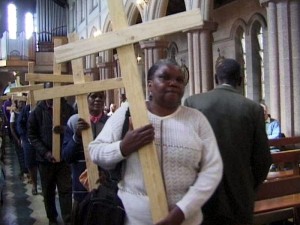“The Suffering Church of Zimbabwe”: A summary of observations by ten South African Church leaders

Report Cover Photo: Procession with crosses to commemorate those who have died in political violence since 2000 in Zimbabwe: 29 June 2002, St Mary’s Cathedral, Bulawayo
The Solidarity Peace Trust has a Board consisting of church leaders of Southern Africa and is dedicated to promoting the rights of victims of human rights abuses in Zimbabwe. The Trust was founded in 2003. The Chairperson is Catholic Archbishop Pius Ncube of Bulawayo, and the Vice Chairperson is Anglican Bishop Rubin Phillip of Kwazulu Natal.
In August and September of this year, The Solidarity Peace Trust organised for ten priests and pastors from South African parishes to spend a fortnight in Zimbabwe. The priests came from Kwazulu Natal, Gauteng and Cape Town, and were billeted with Zimbabwean priests in urban centres around the country. They came from a cross section of denominations, including Roman Catholic, Anglican, Methodist, Baptist, and various Evangelical churches. The hosting towns were Harare, Chitungwiza, Bulawayo, Mutare, Kwekwe, Gweru, Masvingo, and other small towns. The priests arrived in mid August and left on 3 September.
The vision behind the exchange was that it would give South African priests the opportunity to to experience at first hand the problems being faced in our parishes at this time, and to carry this knowledge back with them to their bigger church communities in South Africa, to express solidarity with their Zimbabwean counterparts.
The visit also coincided with the Urban Council Elections in Zimbabwe, and while the priests were not formal observers, they were able to informally observe and comment on the elections in their hosting parishes.
There was no precise agenda given to the visitors apart from this – to be in Zimbabwe in solidarity and to live the life of a local parish priest for two weeks, to meet with ordinary parishioners and gather impressions of the current state of the nation.
On their last day in the country, the South African priests gathered in one city, together with a few Zimbabwean facilitators, and spent many hours discussing their observations with one another. The entire conversation was recorded and transcribed. In addition, priests also submitted their written findings at a later date.
Summary of findings
What was clear was that all the South African priests were deeply saddened and moved by what they observed. Some had been to Zimbabwe before in the recent past, and even they were shocked at the decline and the current poverty and starvation in small urban centres. Everyone commented on the high levels of fear in the general populace. Some had very personal exposure to intimidation, with one South African priest being chased out of his hosting parish by suspected CIO threats, and several others hearing terrible accounts of State torture from victims themselves. Priests were shocked at the inability of victims to receive justice, particularly as in several cases the torturers were the police.
Several witnessed what they considered election irregularities over the Urban Council Elections. All were horrified at the endless queues, the depression, the hopelessness, the exorbitant cost of basic commodities. Starvation and poverty and also the impact of HIV/Aids were frequent themes. The plight of the youth in particular was another common theme.
The visiting clerics also commented on the divisions within the Zimbabwean church, the silence of many priests and the collusion of yet others with government. They also noted the persecution of those priests who spoke out. Zimbabwean priests were able to learn much from their visitors, who were mostly very active in the struggle against apartheid in their own country, and who can remember facing the same timidity and insecurity in their own recent pasts.
The South African visitors drew their own conclusions as to who is to blame for the state of Zimbabwe today – western imperialism? or misrule by its own government? Observations were also made about the “land issue”.
Finally, the South African priests all felt there was a real need for them to do more – all were touched and wanted to return to South Africa and spread the word of their experiences, and to be available to help their Zimbabwean counterparts in any way possible. All felt they would pray for Zimbabwe, and some felt there was need for real action, that prayer without action was meaningless. The South Africans intend to lobby their own government based on their findings, and to inform their own parishes. Several have already spoken out strongly since their return including to the media.











![PASSOP, an NGO supporting Zimbabweans in De Doorns, is banned from entering the IDP camp, and here holds a meeting with them through the fence! They deliver “the Zimbabwean” newspaper – news from home read avidly. [30 May 2010] PASSOP, an NGO supporting Zimbabweans in De Doorns, is banned from entering the IDP camp, and here holds a meeting with them through the fence! They deliver “the Zimbabwean” newspaper – news from home read avidly. [30 May 2010]](https://solidaritypeacetrust.org/wp-content/gallery/a-fractured-nation/thumbs/thumbs_image113.jpg)
